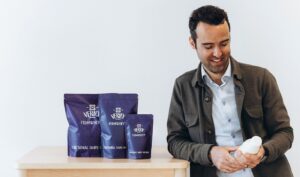New York-based Keychain, which has an online platform through which packaged goods companies and retailers with private label operations can find manufacturing partners, has closed a $15 million Series A round led by BoxGroup.
The round, which follows an $18 million seed round announced last year, was also backed by new investors General Mills and Schreiber Foods, and existing investors including Lightspeed Venture Partners and SV Angel.
Keychain’s first product, a search and discovery platform, is now working at scale for US-based food and beverage brands, retailers, and manufacturers, said cofounder and CEO Oisin Hanrahan. “This has happened much faster than we expected. From here we’re excited to build a deep set of AI-powered workflow tools to help our brand and retail partners bring products to market faster.
“In addition, you can expect an announcement on new verticals and geographies soon.”
“We’re constantly looking for new ways to increase the efficiency of our supply chain workflows, and it’s rare that our team finds a product that they are universally positive about using. We believe Keychain is going to change how the CPG industry works to advance the contract manufacturing industry.” Paul Gallagher, chief supply chain officer, General Mills
20,000 US manufacturers indexed on platform in under 8 months
For a sector that deploys cutting-edge tech in everything from logistics to pathogen control, the food industry is still stuck in the dark ages when it comes to finding co-manufacturers, says Hanrahan, who cofounded home maintenance platform Handy HQ before selling it to Angie’s List (now Angi), and is now applying the Angi playbook to CPG manufacturing.
If you’re a brand or a retailer looking for someone to manufacture your product, he says, the options are not great: word of mouth and existing contacts, trade shows, pricey consultants, brokers, and if all else fails, Google.
The problem with these approaches, he claims, is that they are both limited by the size and scope of your existing network, expensive, time-consuming, and in the case of online searches, very imprecise: does manufacturer X have the equipment that can actually make your product?
“We took everything we learned at Handy and Angi and decided to build technology for brands and retailers to manage their relationship with manufacturers, ingredient companies and packaging companies.
“We got the seed capital and started building what is now the deepest data set of manufacturing in the United States that allows any brand or retailer to look up over a million SKUs [stock keeping units] and find co-manufacturers with the capabilities to produce them.”
He adds: “If you’re in the private [label] sourcing department of a large retailer, for example, we’ve already indexed all of your products from over 300 sources online, plus some data feeds we’ve bought. We then have our own data models that analyze every single product and tag it on a process level and at a packaging level.
“Say you want to find a co-packer for a certain kind of trail mix. We use AI to analyze the packaging and the ingredients in the description in order to determine what processing and packaging equipment is needed to manufacture it. We then show you which of the 20,000 US manufacturers on our platform can make it. You can then filter them by certification or location, for example.”
“When we first got involved in Keychain, the enormous opportunity to help organize and support domestic manufacturing was obvious. What we’ve come to appreciate in the last few months is the incredibly important role Keychain will play in shaping global CPG trade, and the import and export of food, materials, and packaging. From sovereign funds, to commodity exchanges, to certification agencies, they all have a clear, strategic reason to want a relationship with Keychain.” David Tisch, managing partner, BoxGroup
10,000 brands and retailers
As for information on co-manufacturers, he says, “Most people who come into this start by doing online searches. We do the opposite and start by looking at every single company that’s listed as a private enterprise in the United States. And then we use that data set to identify which ones we think are manufacturers based on the signals we get from NAICS codes [used to categorize companies based on their primary business activity] and all the rest.
“Then from there, we do online data collection, most of it automated, coupled with manual research. We also have relationships with sellers of equipment and machinery who tell us who they’ve sold machinery to, which allows us to enrich the data.”
But ultimately, he says, “What drives more manufacturers to engage on Keychain is the fact that we have so many brands and retailers engaged, and they want to be a part of it. So it becomes a virtuous cycle [as they help Keychain populate its platform].”
Beyond search: Onboarding and ongoing workflow tools
Like most platforms attempting to connect partners in any given industry, Keychain is looking to be far more than a CPG matchmaking site, he stresses. “We are building the full stack to go from search and discovery to scheduling the call, signing an NDA, going through your product specs, packaging approval, going through master service agreement negotiations, final nutrition panel sign off, and so on.
“Ultimately, we’ll probably get to financing as well, but we’re building in each of those individual segments. And each of these workflows will become their own marketplaces in areas such as ingredients and packaging where we’re bringing in suppliers. So we see this platform supporting all of the different parts of the supply chain. It’s about bringing the entire ecosystem together end to end.”
Right now, Keychain is focused on the US but is looking to expand both its geographical reach and the number of categories it covers, he says.
“So today we do food and beverage in the US, but we’re obviously looking at Canada and Mexico and other markets as well as categories such as supplements, pet care, household beauty, and personal care.”





